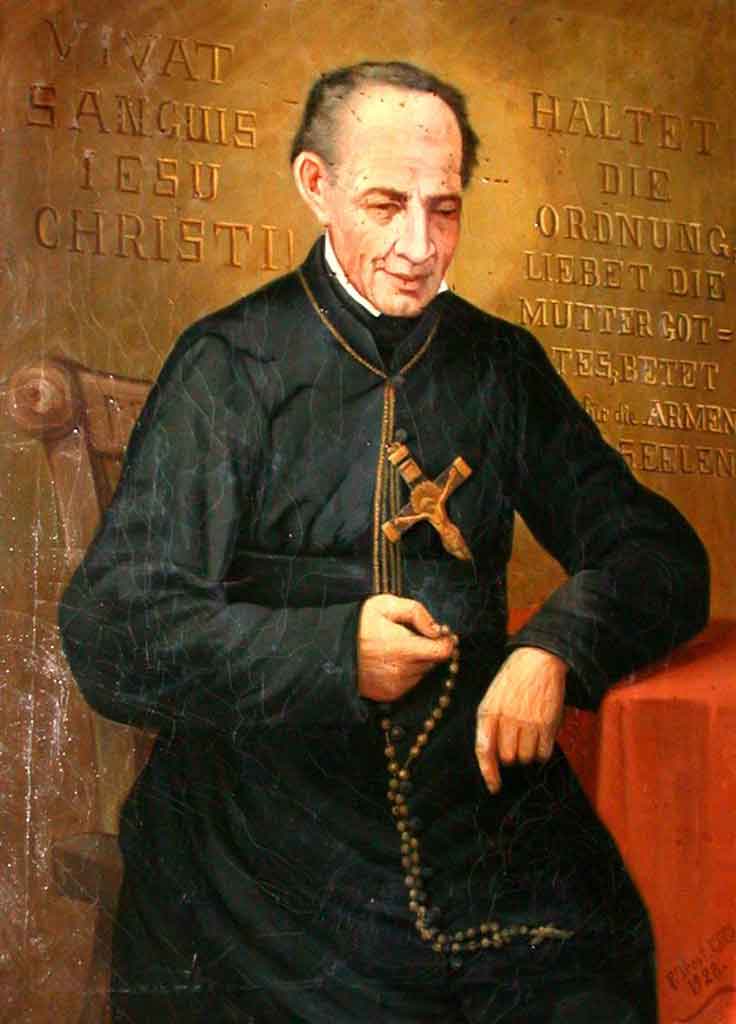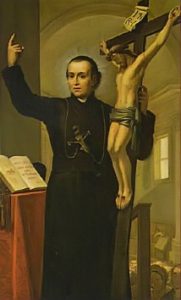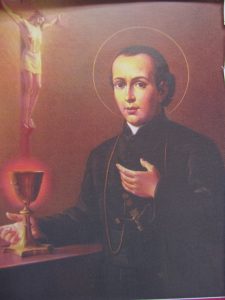
St. Gaspar del Bufalo was a priest, a founder, and a missionary preacher. Gaspar was born in 1786 in Rome. His parents named him Gaspar Melchior Balthazar in memory of the traditionally attributed names of the three Magi who sought and venerated Christ as an infant. His father, Antonio del Bufalo, got a job as a cook for a royal family when Gaspar was a little boy. Antonio and his wife Annunziata were devout Catholics, and they brought up their son to be pious and to look after the needs of others. The family lived in the servant’s quarters in the Altieri Palace. Even as a child, Gaspar showed concern for the poor and the sick He spent much of his free time visiting them, sometimes with a small gift or a pastry to share. In his teens, he spent his summer school breaks delivering meals to the poor and visiting hospitals and shut-ins. When he was eighteen, Gaspar and some friends formed a group to carry out corporal and spiritual works of mercy. They provided a safe place to sleep for the homeless and gave simple catechism classes for poor children. He attended seminary at the Roman College and continued teaching religious classes as well as overseeing the homeless shelter and visiting hospital patients.
POLITICAL TURMOIL AND IMPRISONMENT
Gaspar was ordained a priest in 1808 and age twenty two. Soon afterward, he began meeting with farm laborers who came to Rome to sell their goods. He saw their need for receiving the Sacraments and for directing their lives according to the teachings of Christ, and he gathered them together in the evening for classes. Soon after his ordination, turmoil overtook Rome, when the Emperor Napoleon Bonaparte dissolved the Papal States. Pope Pius VII was arrested and exiled from Rome. Fr. Gaspar was required to make an oath of loyalty to the Emperor, which he refused. He was arrested and sentenced to prison in Corsica. His health, which had never been robust, deteriorated during his confinement. He made the best of the situation, however, and in the long periods of silence and isolation, he firmed his resolve to continue his work. His ideal was to form a group who carried out spiritual and corporal works of mercy combined with devotion to the Precious Blood of Christ.

FOUNDING OF A NEW CONGREGATION
When Napoleon fell from power in 1814, Fr. Gaspar was freed after nearly five years’ imprisonment. He returned to Rome, finding it in a state of disarray. The Church had been decimated by the occupation of Napoleon’s hostile forces and was in great need of renewal. With Pius VII restored to his see, he appointed Fr. Gaspar to preach missions in and around Rome to call people back to living their faith. Just twenty nine years old, Fr. Gaspar formed a small group of like-minded men into the Congregation of the Most Precious Blood. Initially, the group made no vows and was held together only by charity. They set out in the area to preach missions, each man carrying a mission crucifix. The initial group of four men attracted more members and their preaching became very effective in drawing hearts away from sinfulness. Fr. Gaspar was known to be especially persuasive when speaking to thieves and bandits.
PREACHING TO RESTORE ORDER
There were portions of Italy at that time which were so under control of robbers, the municipal authorities were powerless to keep order. The Pope, as temporal ruler, even considered completely leveling one town which had become a hub for the criminals. A Cardinal who was serving Pius VII had learned of Fr. Gaspar’s preaching and he arranged for the young preachers to be sent to the areas plagued by crime. By then, the group had attracted nearly fifty members, and they established numerous small mission houses. The little groups of five preachers set out with no other protection than a crucifix and came to no harm. They would preach in the towns at night, urging people with the Gospel message of repentance and seeking the Kingdom of Christ. They taught children during the day. Astonishingly, the crime problem was contained within two years of the establishment of the Precious Blood father’s mission houses. Unfortunately, Fr. Gaspar faced strong opposition from authorities within the Church. While Pope Pius VII admired Fr. Gaspar and his work, his successor, Pope Leo XII, did not. Fr. Gaspar believed the problem to lie more with him than with the mission, so he volunteered to step down as monitor of the Congregation. After meeting with Leo XII, the situation was resolved. However, in 1828 his enemies sought to have Fr. Gaspar named as nuncio to Brazil in order to oust him from Rome. He declined the appointment, and was eventually appointed to the Congregation for the Propagation of the Faith, allowing him to remain in Rome, where he was very popular. The successor of Leo, Pius VIII, withdrew support for the Congregation. Disheartened by the years of harassment and false accusations, Fr. Gaspar moved to one of the mission houses, where he continued to tend to the needy of the area. After aiding victims of a cholera outbreak in Rome, he died December 28, 1837 at age fifty-one. The doctor who examined his body declared him a “victim of charity”, exhausted by years of taking care of others.

After Fr. Gaspar’s death, the proof of Pope Pius VII’s granting of legality and approval of the Rule for the Congregation of the Precious Blood was found and honored. The work of the Congregation continues to this day worldwide, and members now take vows of fidelity to the laws of the order. St. Gaspar del Bufalo lived a life filled with service to the sick and the poor and with calling people to the holiness to which we are all called. He was beatified in 1904 and canonized in 1954.
